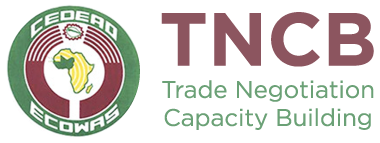The Economic Community of West African States (ECOWAS) is a regional group of fifteen countries. Its mission is to promote economic integration in all fields of economic activity. The ECOWAS Trade Negotiation Capacity Building (TNCB) Project was set up to build the capacity of member states of the Community to effectively engage in International Negotiations and Multilateral Trade Agreements. It is co-funded by the Economic Community of West African States (ECOWAS) and the Swedish International Development Agency (SIDA).
The project has focused on the building of human capacity at both the national and regional level. For negotiators to be able to translate their results into implementable policy strategies, the relevant institutional and organisational structures must exist. As a result, the project is also geared to assisting member states to put these necessary structures in place for more effective participation in international trade.
Objectives
The objectives of the ECOWAS Trade Negotiation Capacity Building (TNCB) Project are as follows:
- Increase the knowledge of multilateral trade rules and enhance the understanding of the importance of multilateral trade for development and poverty reduction in the ECOWAS region,
- Increase economic integration among the member countries, and
- Increase the capacity in ECOWAS Member States to negotiate multilateral trade agreements at regional and national level
- Strengthen dialogue platforms and institutional structures for Trade Policy formulation, negotiation, implementation and negotiation
Structure
The Project Steering Committee is made up of the Directors of Trade within the region, as well as officials from the ECOWAS Commission. The Commissioner for Trade, Customs, Free Movement and Tourism of the ECOWAS Commission, chairs the Project Steering Committee. The responsibilities of the Project Steering Committee are to oversee and guide the Project activities, also to improve the Annual work programme and the budget.
The Project Coordinator is responsible for the daily management of the project and is accountable to the Project Steering Committee through the Commissioner.
Achievements
Training: As at December 2014, the project has trained over 500 participants from Government Ministries, Department and Agencies (MDAs), Private Sector Organizations and Civil Society Organizations, across its 15 Member States in increasing their knowledge in multilateral trade rules and enhancing their understanding of the Trade policy.
Institutional Structures: Furthermore, The project has strengthened national Inter-Institutional committees (IICs), or established Inter-Institutional (IICs) where they did not previously exist, as a key platform for dialogue on Trade Policy issues.
Technical Assistance: The project has provided technical assistance to the ECOWAS Commission towards the finalization and adoption of the ECOWAS Common External tariff, as well as the formulation of the Common Trade Policy issues.
Member States
ECOWAS is a region made up of 15 countries (as listed below) with a combined population of approximately 340 million inhabitants (2013), covering a land mass of 5,112,903 km2.
- Benin
- Burkina Faso
- Cape Verde
- Cote d’Ivoire
- Gambia
- Ghana
- Guinea
- Guinea Bissau
- Liberia
- Mali
- Niger
- Nigeria
- Senegal
- Sierra Leone
- Togo
Activities
The main activities of the TNCB Project are:
Partners
ECOWAS
The Economic Community of West African States (ECOWAS) is a regional group of fifteen countries, founded in 1975. Its mission is to promote economic integration in “all fields of economic activity, particularly industry, transport, telecommunications, energy, agriculture, natural resources, commerce, monetary and financial questions, social and cultural matters …”
The Institutions of the Economic Community of West African States (ECOWAS) are as follows:
- The Commission
- The Community Parliament
- The Community Court of Justice
- ECOWAS Bank for Investment and Development (EBID)
- Various other Specialized agencies
SIDA
Swedish International Development Agency (SIDA)is a government agency working on behalf of the Swedish parliament and government, with the mission to reduce poverty in the world. Through their work and in cooperation with others, they contribute to implementing Sweden’s Policy for Global Development (PGD).
FAQ
Frequently Asked Questions





